Research Proposal: The Future and Development of Islamic Accounting
VerifiedAdded on 2023/06/14
|11
|808
|290
Report
AI Summary
This research proposal explores the future of Islamic accounting, aiming to analyze its global prospects, the role of Islamic banks, and its advantages and disadvantages compared to conventional finance. The proposal includes a literature review, research questions, and methodology focusing on the UAE's Islamic accounting market, comparing Islamic and conventional banks. It seeks to understand the development of Islamic accounting, its historical influence, and its potential for future growth, referencing key studies and intellectual contributions in the field. Desklib provides access to this and other student-contributed assignments.
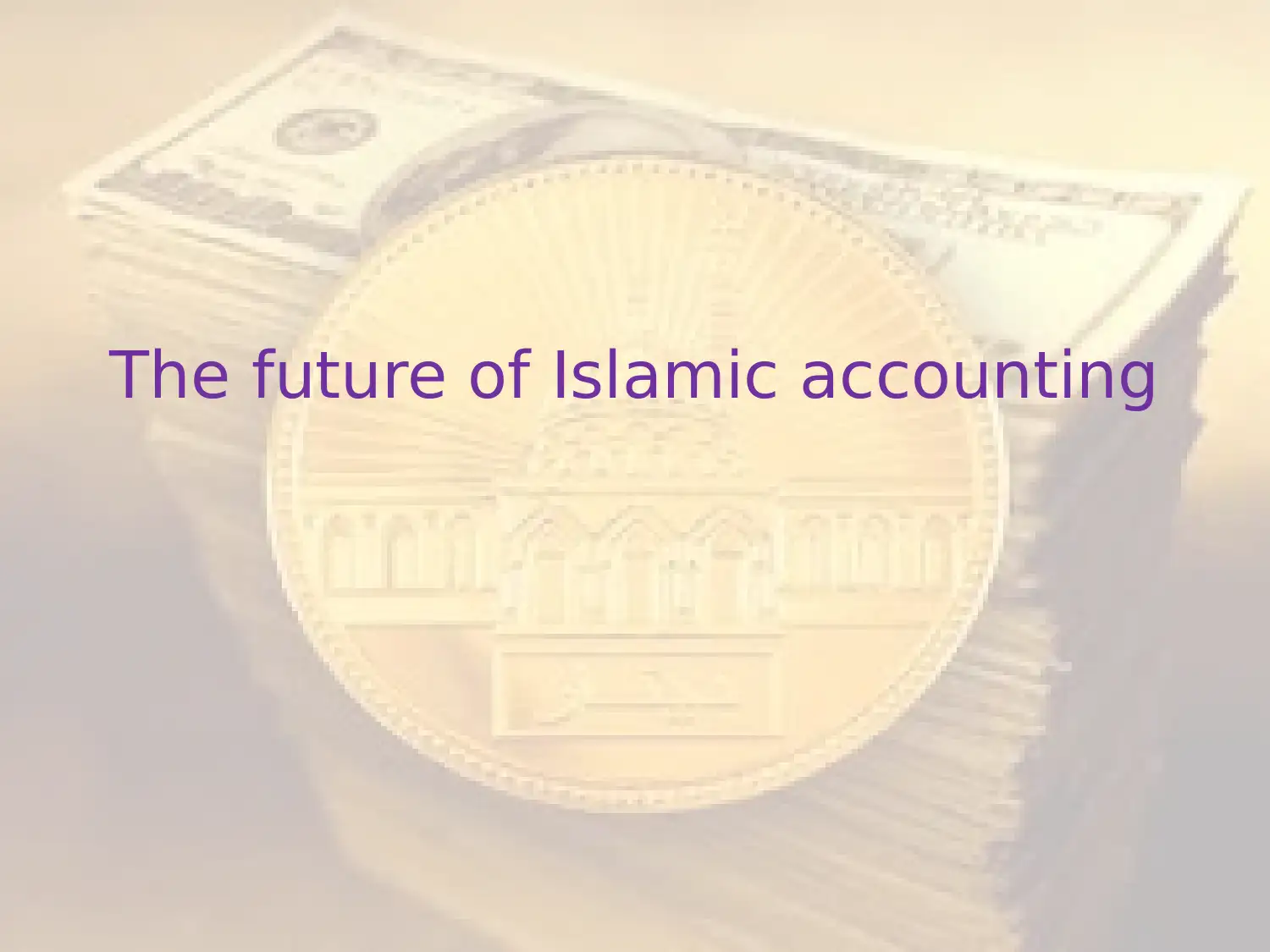
The future of Islamic accounting
Paraphrase This Document
Need a fresh take? Get an instant paraphrase of this document with our AI Paraphraser
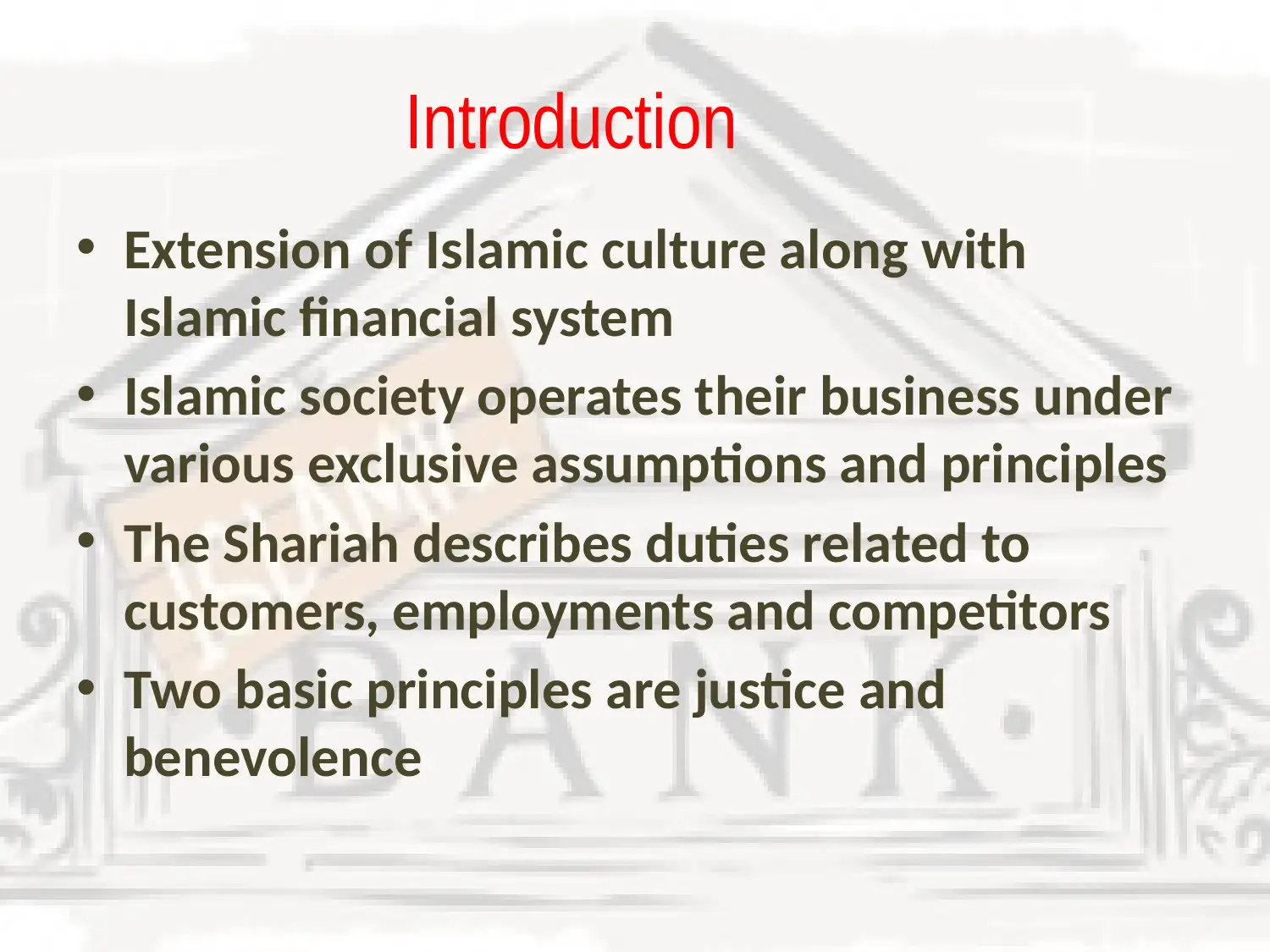
Introduction
• Extension of Islamic culture along with
Islamic financial system
• Islamic society operates their business under
various exclusive assumptions and principles
• The Shariah describes duties related to
customers, employments and competitors
• Two basic principles are justice and
benevolence
• Extension of Islamic culture along with
Islamic financial system
• Islamic society operates their business under
various exclusive assumptions and principles
• The Shariah describes duties related to
customers, employments and competitors
• Two basic principles are justice and
benevolence
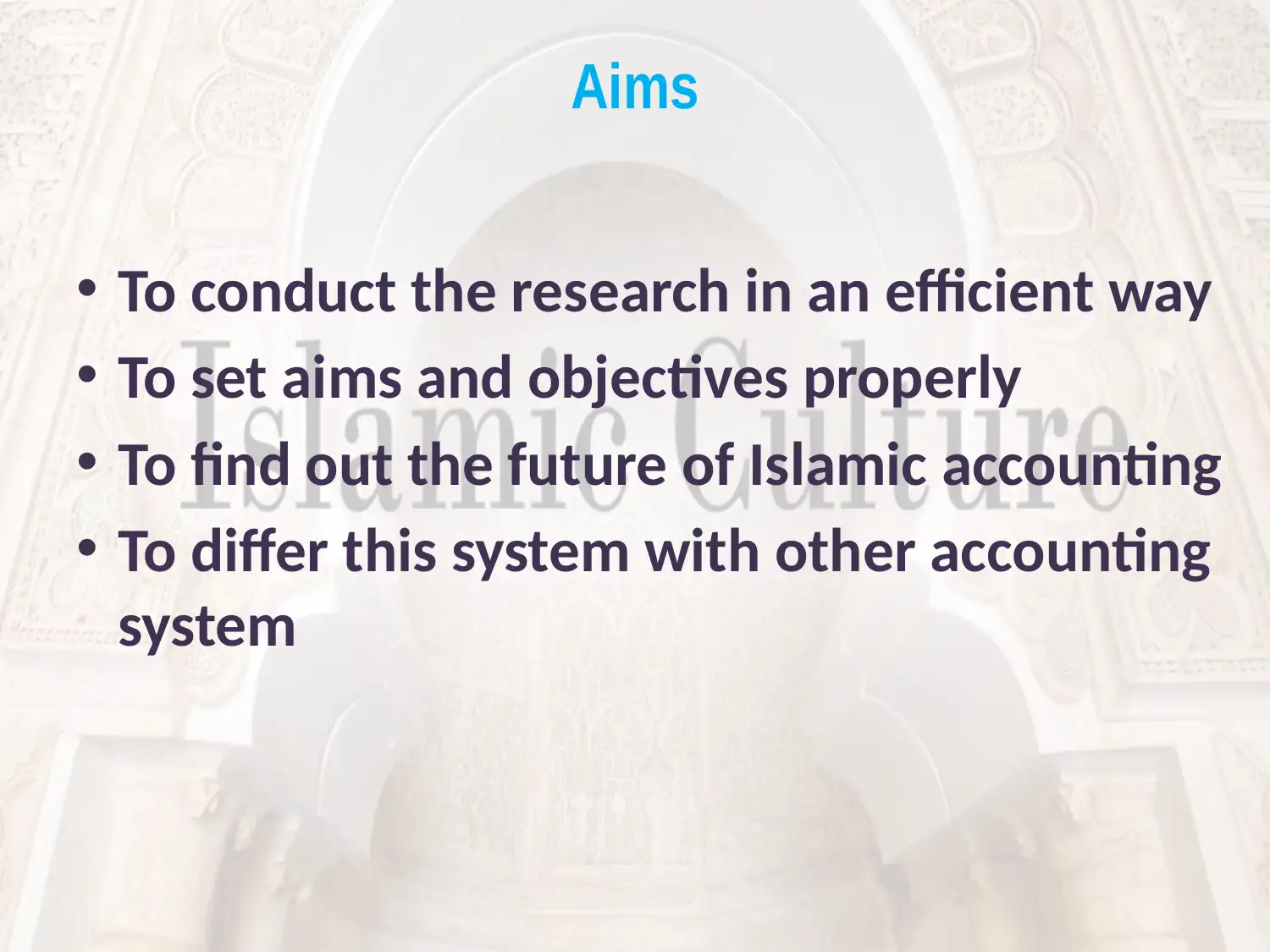
Aims
• To conduct the research in an efficient way
• To set aims and objectives properly
• To find out the future of Islamic accounting
• To differ this system with other accounting
system
• To conduct the research in an efficient way
• To set aims and objectives properly
• To find out the future of Islamic accounting
• To differ this system with other accounting
system
⊘ This is a preview!⊘
Do you want full access?
Subscribe today to unlock all pages.

Trusted by 1+ million students worldwide
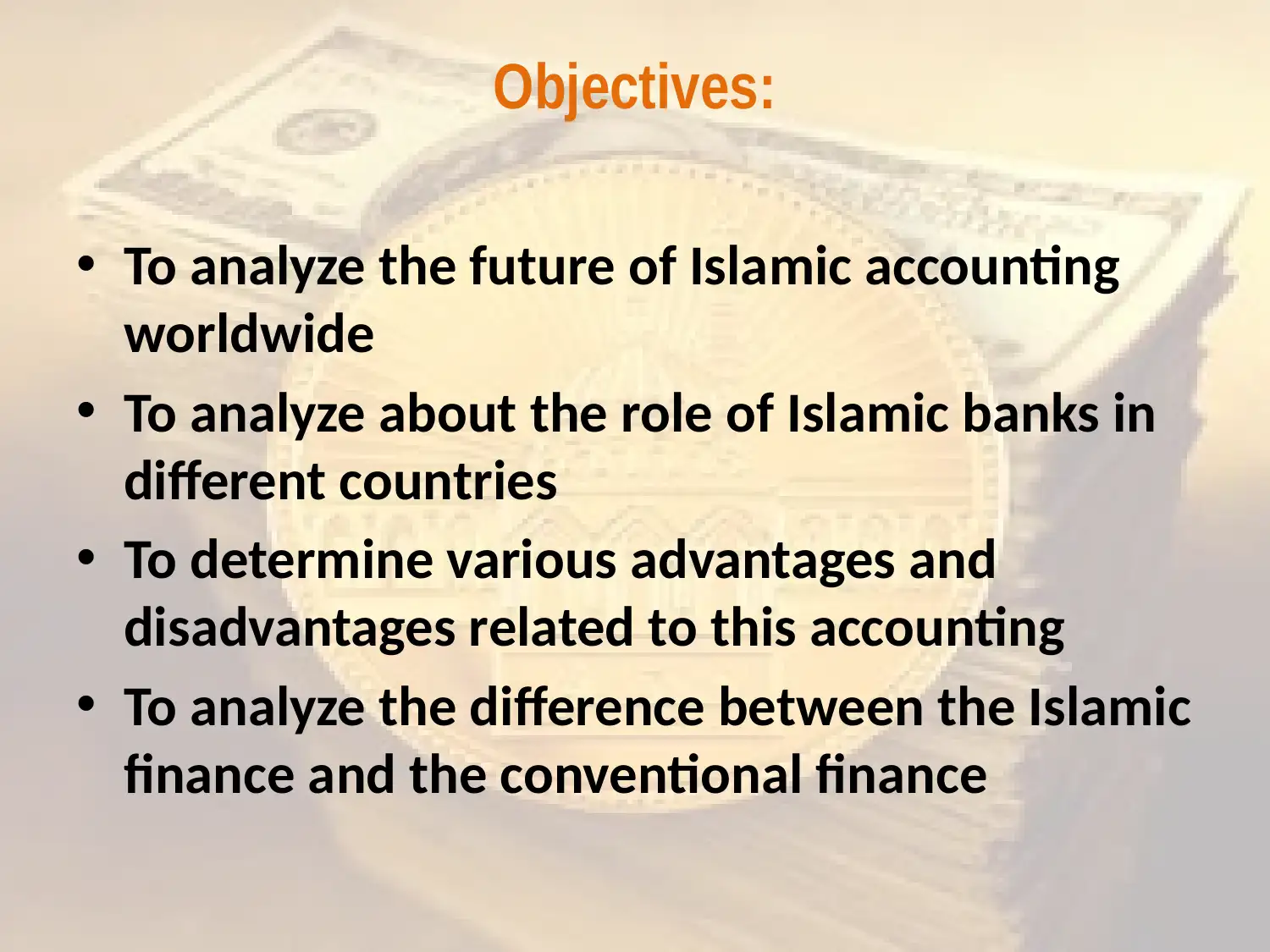
Objectives:
• To analyze the future of Islamic accounting
worldwide
• To analyze about the role of Islamic banks in
different countries
• To determine various advantages and
disadvantages related to this accounting
• To analyze the difference between the Islamic
finance and the conventional finance
• To analyze the future of Islamic accounting
worldwide
• To analyze about the role of Islamic banks in
different countries
• To determine various advantages and
disadvantages related to this accounting
• To analyze the difference between the Islamic
finance and the conventional finance
Paraphrase This Document
Need a fresh take? Get an instant paraphrase of this document with our AI Paraphraser
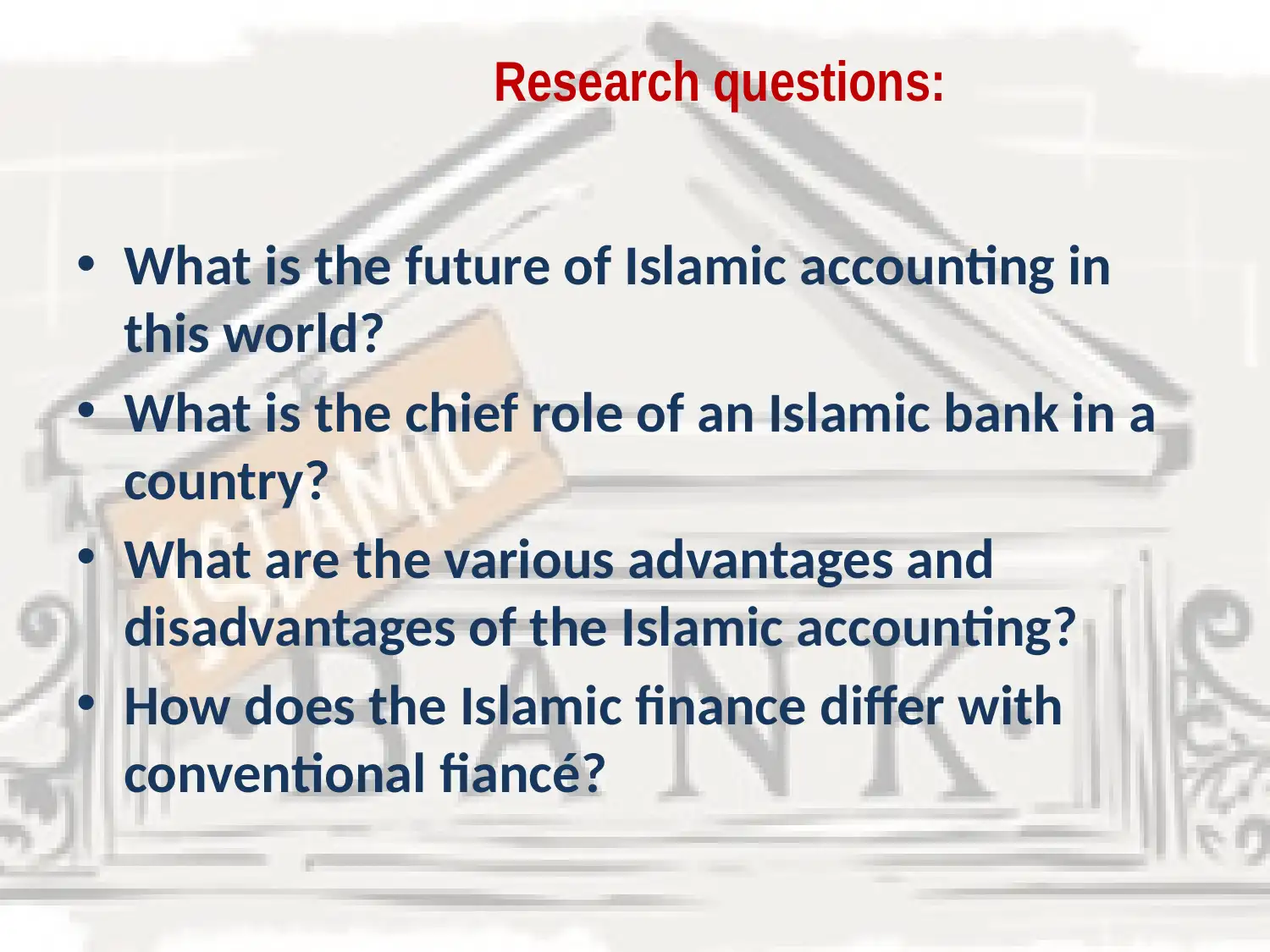
Research questions:
• What is the future of Islamic accounting in
this world?
• What is the chief role of an Islamic bank in a
country?
• What are the various advantages and
disadvantages of the Islamic accounting?
• How does the Islamic finance differ with
conventional fiancé?
• What is the future of Islamic accounting in
this world?
• What is the chief role of an Islamic bank in a
country?
• What are the various advantages and
disadvantages of the Islamic accounting?
• How does the Islamic finance differ with
conventional fiancé?
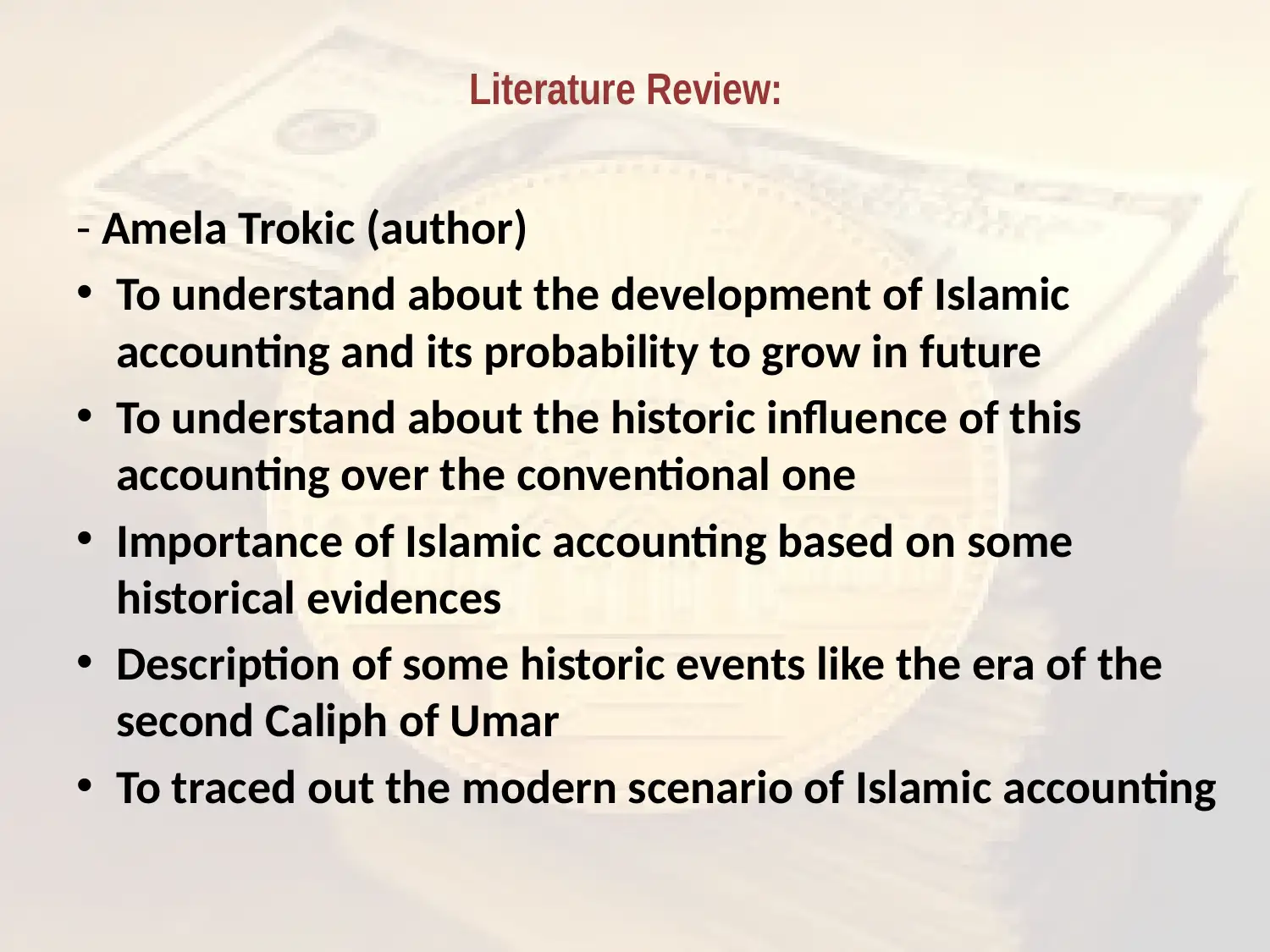
Literature Review:
- Amela Trokic (author)
• To understand about the development of Islamic
accounting and its probability to grow in future
• To understand about the historic influence of this
accounting over the conventional one
• Importance of Islamic accounting based on some
historical evidences
• Description of some historic events like the era of the
second Caliph of Umar
• To traced out the modern scenario of Islamic accounting
- Amela Trokic (author)
• To understand about the development of Islamic
accounting and its probability to grow in future
• To understand about the historic influence of this
accounting over the conventional one
• Importance of Islamic accounting based on some
historical evidences
• Description of some historic events like the era of the
second Caliph of Umar
• To traced out the modern scenario of Islamic accounting
⊘ This is a preview!⊘
Do you want full access?
Subscribe today to unlock all pages.

Trusted by 1+ million students worldwide
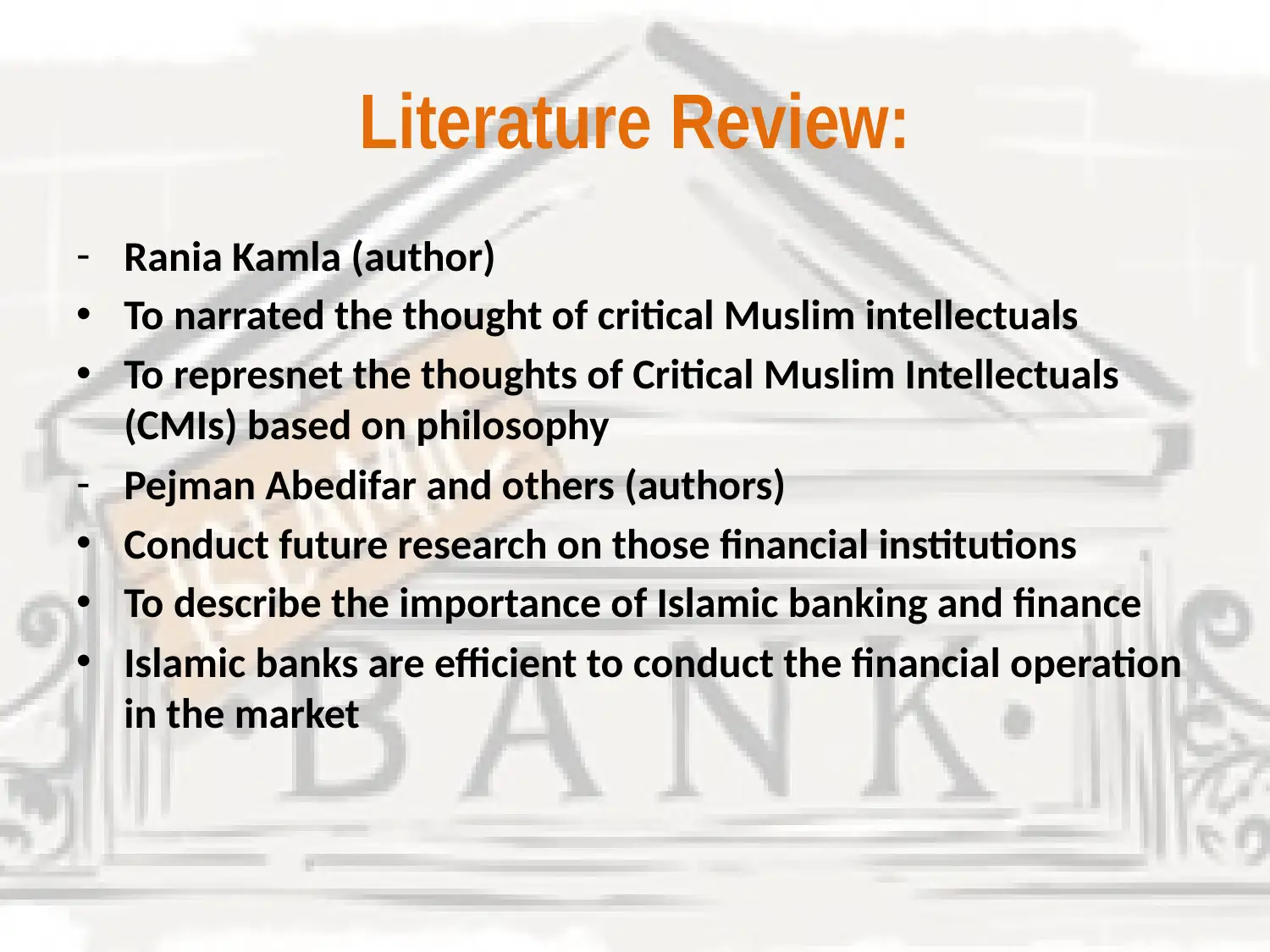
Literature Review:
- Rania Kamla (author)
• To narrated the thought of critical Muslim intellectuals
• To represnet the thoughts of Critical Muslim Intellectuals
(CMIs) based on philosophy
- Pejman Abedifar and others (authors)
• Conduct future research on those financial institutions
• To describe the importance of Islamic banking and finance
• Islamic banks are efficient to conduct the financial operation
in the market
- Rania Kamla (author)
• To narrated the thought of critical Muslim intellectuals
• To represnet the thoughts of Critical Muslim Intellectuals
(CMIs) based on philosophy
- Pejman Abedifar and others (authors)
• Conduct future research on those financial institutions
• To describe the importance of Islamic banking and finance
• Islamic banks are efficient to conduct the financial operation
in the market
Paraphrase This Document
Need a fresh take? Get an instant paraphrase of this document with our AI Paraphraser
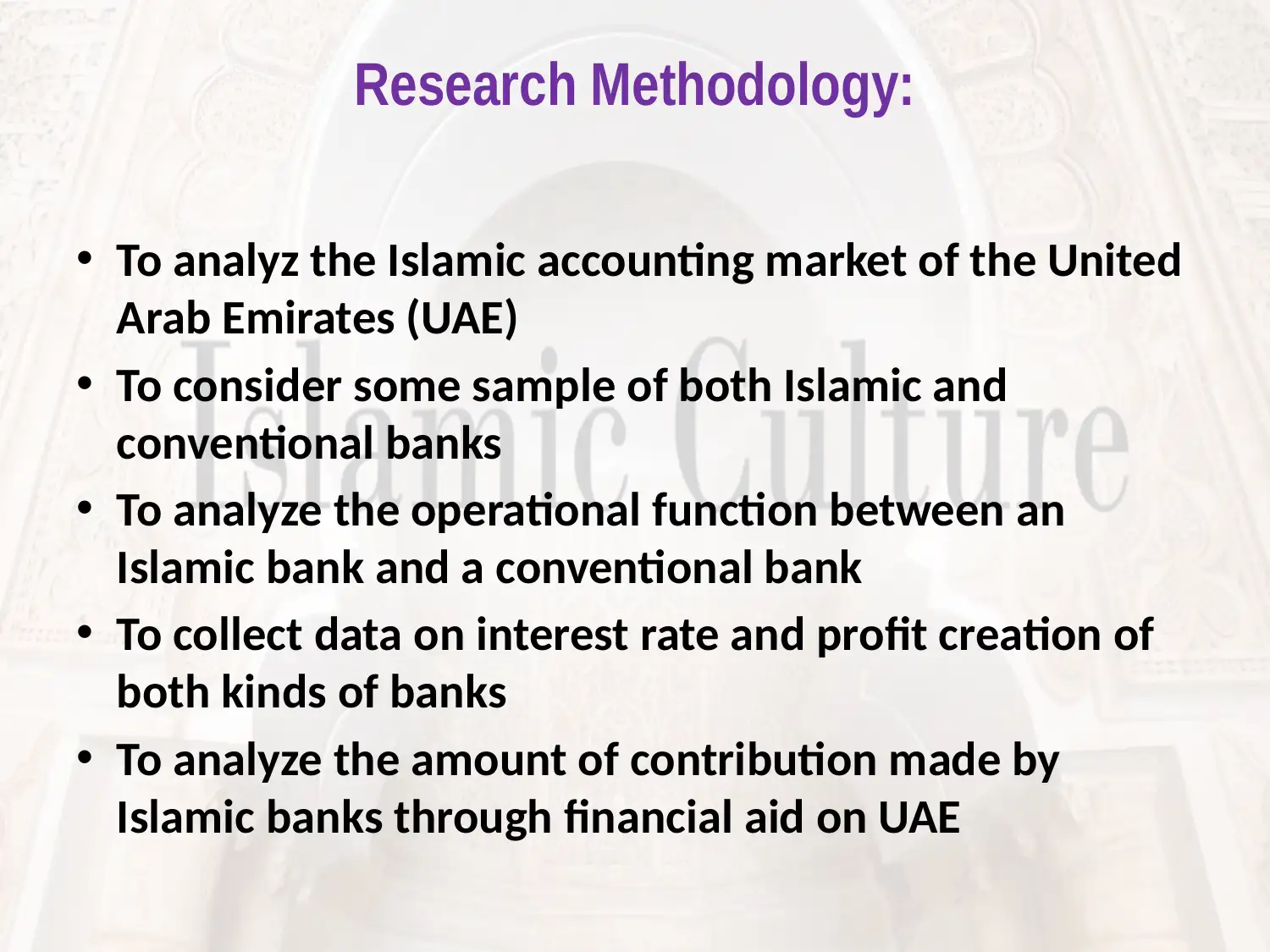
Research Methodology:
• To analyz the Islamic accounting market of the United
Arab Emirates (UAE)
• To consider some sample of both Islamic and
conventional banks
• To analyze the operational function between an
Islamic bank and a conventional bank
• To collect data on interest rate and profit creation of
both kinds of banks
• To analyze the amount of contribution made by
Islamic banks through financial aid on UAE
• To analyz the Islamic accounting market of the United
Arab Emirates (UAE)
• To consider some sample of both Islamic and
conventional banks
• To analyze the operational function between an
Islamic bank and a conventional bank
• To collect data on interest rate and profit creation of
both kinds of banks
• To analyze the amount of contribution made by
Islamic banks through financial aid on UAE
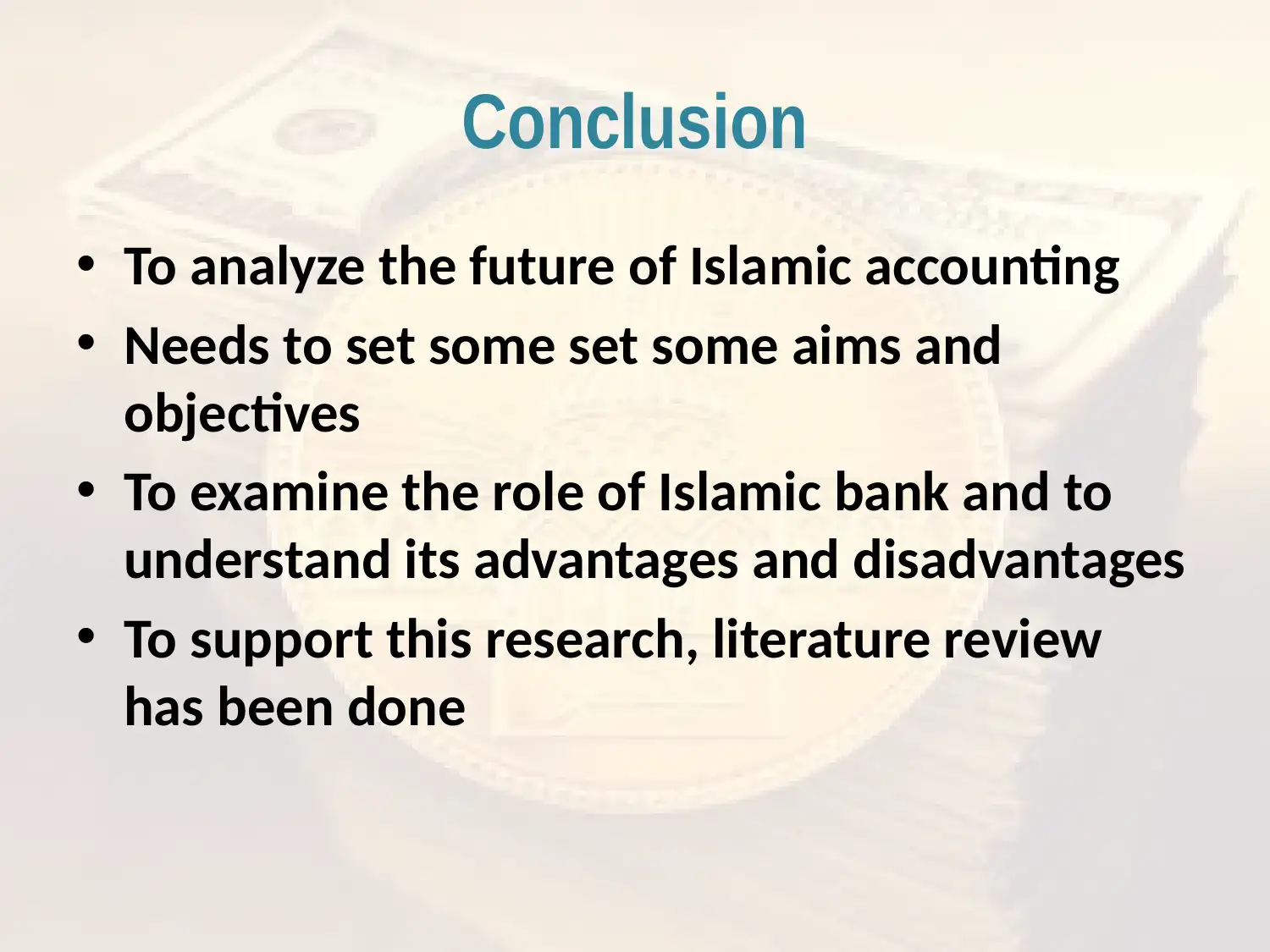
Conclusion
• To analyze the future of Islamic accounting
• Needs to set some set some aims and
objectives
• To examine the role of Islamic bank and to
understand its advantages and disadvantages
• To support this research, literature review
has been done
• To analyze the future of Islamic accounting
• Needs to set some set some aims and
objectives
• To examine the role of Islamic bank and to
understand its advantages and disadvantages
• To support this research, literature review
has been done
⊘ This is a preview!⊘
Do you want full access?
Subscribe today to unlock all pages.

Trusted by 1+ million students worldwide
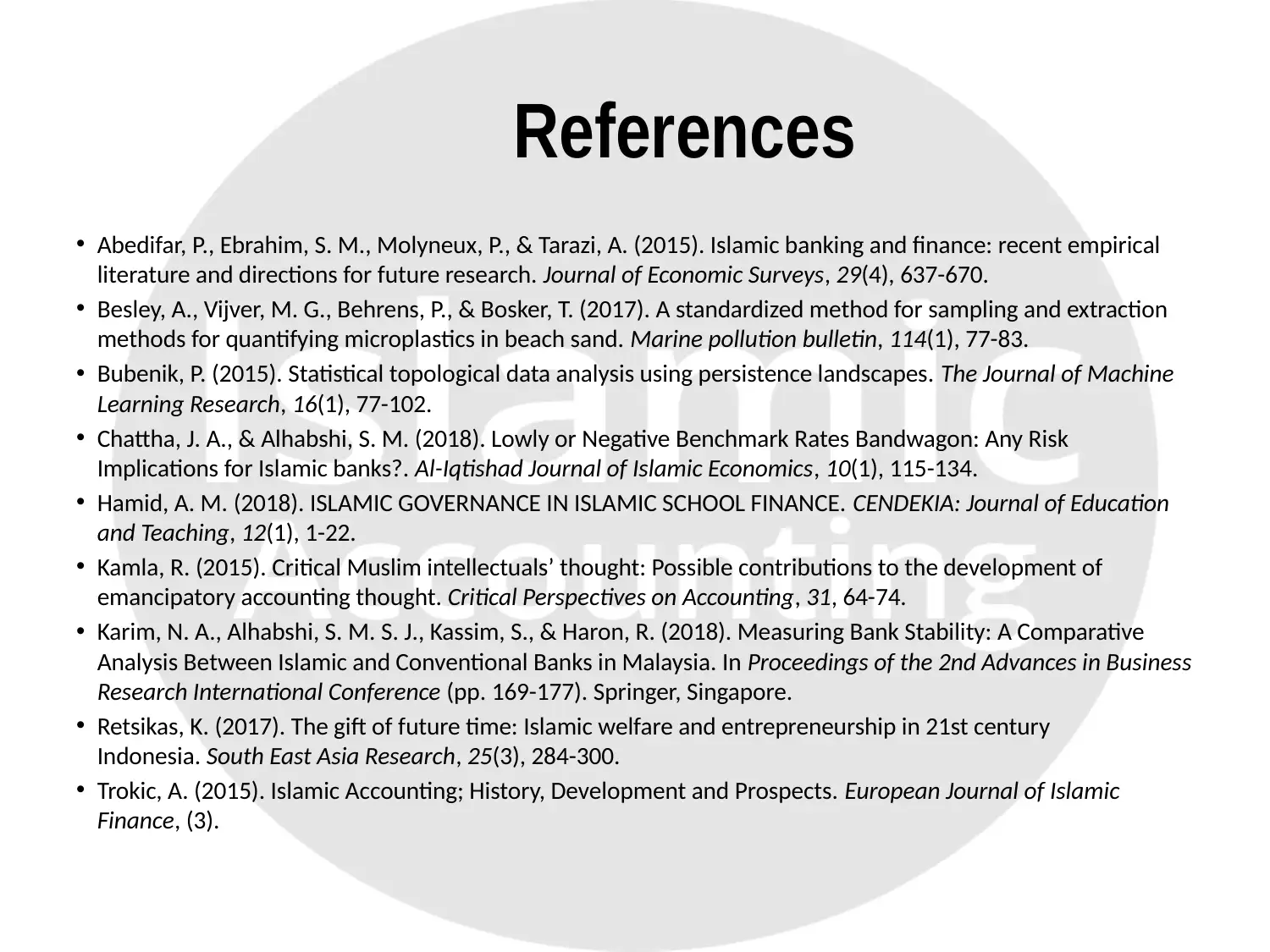
References
• Abedifar, P., Ebrahim, S. M., Molyneux, P., & Tarazi, A. (2015). Islamic banking and finance: recent empirical
literature and directions for future research. Journal of Economic Surveys, 29(4), 637-670.
• Besley, A., Vijver, M. G., Behrens, P., & Bosker, T. (2017). A standardized method for sampling and extraction
methods for quantifying microplastics in beach sand. Marine pollution bulletin, 114(1), 77-83.
• Bubenik, P. (2015). Statistical topological data analysis using persistence landscapes. The Journal of Machine
Learning Research, 16(1), 77-102.
• Chattha, J. A., & Alhabshi, S. M. (2018). Lowly or Negative Benchmark Rates Bandwagon: Any Risk
Implications for Islamic banks?. Al-Iqtishad Journal of Islamic Economics, 10(1), 115-134.
• Hamid, A. M. (2018). ISLAMIC GOVERNANCE IN ISLAMIC SCHOOL FINANCE. CENDEKIA: Journal of Education
and Teaching, 12(1), 1-22.
• Kamla, R. (2015). Critical Muslim intellectuals’ thought: Possible contributions to the development of
emancipatory accounting thought. Critical Perspectives on Accounting, 31, 64-74.
• Karim, N. A., Alhabshi, S. M. S. J., Kassim, S., & Haron, R. (2018). Measuring Bank Stability: A Comparative
Analysis Between Islamic and Conventional Banks in Malaysia. In Proceedings of the 2nd Advances in Business
Research International Conference (pp. 169-177). Springer, Singapore.
• Retsikas, K. (2017). The gift of future time: Islamic welfare and entrepreneurship in 21st century
Indonesia. South East Asia Research, 25(3), 284-300.
• Trokic, A. (2015). Islamic Accounting; History, Development and Prospects. European Journal of Islamic
Finance, (3).
• Abedifar, P., Ebrahim, S. M., Molyneux, P., & Tarazi, A. (2015). Islamic banking and finance: recent empirical
literature and directions for future research. Journal of Economic Surveys, 29(4), 637-670.
• Besley, A., Vijver, M. G., Behrens, P., & Bosker, T. (2017). A standardized method for sampling and extraction
methods for quantifying microplastics in beach sand. Marine pollution bulletin, 114(1), 77-83.
• Bubenik, P. (2015). Statistical topological data analysis using persistence landscapes. The Journal of Machine
Learning Research, 16(1), 77-102.
• Chattha, J. A., & Alhabshi, S. M. (2018). Lowly or Negative Benchmark Rates Bandwagon: Any Risk
Implications for Islamic banks?. Al-Iqtishad Journal of Islamic Economics, 10(1), 115-134.
• Hamid, A. M. (2018). ISLAMIC GOVERNANCE IN ISLAMIC SCHOOL FINANCE. CENDEKIA: Journal of Education
and Teaching, 12(1), 1-22.
• Kamla, R. (2015). Critical Muslim intellectuals’ thought: Possible contributions to the development of
emancipatory accounting thought. Critical Perspectives on Accounting, 31, 64-74.
• Karim, N. A., Alhabshi, S. M. S. J., Kassim, S., & Haron, R. (2018). Measuring Bank Stability: A Comparative
Analysis Between Islamic and Conventional Banks in Malaysia. In Proceedings of the 2nd Advances in Business
Research International Conference (pp. 169-177). Springer, Singapore.
• Retsikas, K. (2017). The gift of future time: Islamic welfare and entrepreneurship in 21st century
Indonesia. South East Asia Research, 25(3), 284-300.
• Trokic, A. (2015). Islamic Accounting; History, Development and Prospects. European Journal of Islamic
Finance, (3).
Paraphrase This Document
Need a fresh take? Get an instant paraphrase of this document with our AI Paraphraser

1 out of 11
Related Documents
Your All-in-One AI-Powered Toolkit for Academic Success.
+13062052269
info@desklib.com
Available 24*7 on WhatsApp / Email
![[object Object]](/_next/static/media/star-bottom.7253800d.svg)
Unlock your academic potential
Copyright © 2020–2026 A2Z Services. All Rights Reserved. Developed and managed by ZUCOL.



